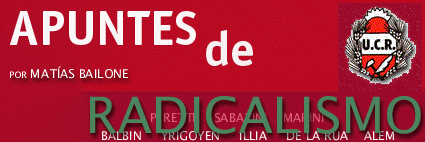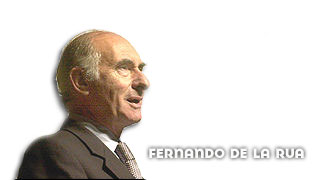
 Oficial Web Site of Fernando De la Rua
Oficial Web Site of Fernando De la Rua
Speech by Dr. Fernando
de la Rúa, President of Argentina
University for Peace Conference
San José, Costa Rica
November 4, 2000
Peace and Social Development in Latin America


“Its my special pleasure today to be with friends of the University for
Peace, an institution which has done splendid work in the preparation and formation
of new generations in an area which has come to be known as “culture of
peace.”
The dissemination of the ideals of mutual understanding, tolerance and pacific coexistence, to stimulate cooperation among people with a view to diminishing the perils of war, constitutes the greatest hope and challenge of the XXIst Century. We have to congratulate ourselves that the international community has perceived in time the need to create an academic institution to prepare young leaders and professionals, in the noble aspirations proclaimed by the UN Charter.
We know that the University for Peace has been undergoing a profound restructuring process, and has launched a series of programs and initiatives. It is destined to become an academic institution of the highest standards, with broad research capacity, which will definitely convert it into a valuable member of the United Nations Family. We support and value this effort, because the complexity of the present international challenges require that both States and the United Nations have access to the intellectual support of specialized institutions, to allow them to act effectively in moments of crisis which may occur.
Now I would like to formulate some considerations concerning the global and regional panorama, from the perspective of peaceful evolution of international relations, which for our countries is indispensable, being the pre-condition for our development and future well-being.
The XXIst Century leaves behind a prolonged strategic-ideological confrontation, giving way to a period in history in which representative democracy, human rights and open economies constitute shared values.
At the same time, we find ourselves in a much more complex world, which is distant from constituting a stable international environment. The explosion of serious intra-state confrontations, as those in the Balkans and in Africa, signal the menace of a new period of conflicts, unfortunately founded on ethnic, cultural and religious grounds.
In the face of these circumstances, we must work decisively towards multilateral consensus, neutralizing and reducing in this way the risks against peace while facilitating the development of nations. We are convinced that, if a consensus were built on major democratization of international relations, the effectiveness and functionality of the international system would benefit.
Given the inability of States to face new menaces in isolation, it becomes imperative to adopt cooperative security policies to eliminate potential conflict risks and strengthen global stability and security.
It is essential to face immediate and substantive causes of conflict in a concerted manner, conflicts which often originate from the absence of economic opportunities and from social inequalities.
It is also necessary to find answers to those questions arising from recent serious crises, as well as from international humanitarian interventions. The principle of non-intervention must be respected as the basis of relations between independent States. But this must not mean indifference in the face of massive and flagrant human rights violations. Adequate answers must be found by organs of the international community, based on consensus, because it is only such neutral action, motivated by humanitarian considerations, which can guarantee actions truly inspired by the UN Charter, without hidden political or power agendas.
With this perspective, the United Nations must give priority to more democratic consensus building in the decision making process of its principal and subsidiary organs.
To maintain international peace and security is the foremost responsibility of the Security Council, and it must therefore be strengthened. If this responsibility is not exercised fully, no other activity of the United Nations can be carried out successfully.
The reform of the Security Council must arise from a consensus that does not, at the same time, result in new discriminations, privileges and exclusions. If the large majority of the international community makes an effort to ensure the respect of democratic values and the concept of universality, a new Security Council must permit a wider participation of all. This cannot be achieved by creating new permanent memberships in addition to those established in 1945. If broader participation is to be reached by the reform, this participation must be shared by all, and not be monopolized by a few. For this reason, Argentina only supports the increase of the number of non-permanent members, a restriction of the veto power, and the adoption of procedural norms that guarantee transparency and the possibility for all member states to participate.
Peacekeeping operations will continue to count on our country's active participation. The most recent conflicts have demonstrated the importance of effective training of military forces acting in those missions. Argentina has acquired significant experience after 42 years of participation, resulting in the creation of the Argentine Joint Training Center for Peace Operations in 1995, in which troops of other UN member States participate. At present, we are part of nine peacekeeping operations and we have put our military and police training centers at the disposal of the United Nations.
In relation to this issue, we are worried about the security and protection of personnel participating in peace maintenance and humanitarian operations. UN personnel and associated staff, including from other agencies providing humanitarian support, face greater risks every day. We understand that practical and legal measures must be adopted, as well as others related to planning and execution, to improve the security of the involved personnel, as we have proposed recently to the Security Council.
In this context, the international community must make an effort to provide assistance to countries facing emergency situations, derived both from natural disasters and armed conflict. In this area, important support is provided by the “White Helmets,” an initiative consisting of a corps of specialized volunteers, organized by United Nations members, to provide humanitarian aid to people in extreme emergency situations.
With regard to regional security, we are living in a hemisphere without a conflict hypothesis, despite the existence of a colonial situation in the South Atlantic, due to the illegal occupation of the Islas Malvinas by an extra-continental power. The region has succeeded in facing eventual differences between States with criteria evolving from reason and rationality. The search for negotiated solutions and, where applicable, conflict resolution mechanisms, are examples of a mature approach which allows facing reality in a constructive and pacific manner. This generalized attitude is of utmost importance and manifests the existence of an atmosphere of political predictability and stability.
Ours is a region without arms of mass destruction and all our nations are committed to ensure their absolute ban. We can say that Latin America is, in deeds and actions, a zone free of nuclear, chemical and radiological weapons.
Latin America was first to give a concrete and affirmative answer to what, in the past, was the principal threat to human survival, the threat of nuclear holocaust amidst an east-west confrontation, through the Treaty of Tlatelolco. Also the majority of Latin American Governments participate as full members of the principal universal disarmament instruments.
We participate in the different multilateral initiatives on military information exchange, which have as an objective the strengthening of trust among military forces of nations, and the elimination of any type of doubts, which created tensions in the past. This favors transparency and strengthens relations of trust with civil society on behalf of the military fully integrated in democratic institutionalism. This undoubtedly is the expression of a vocation of peace and a vision of regional security, whose cooperative nature has been developed and reaffirmed.
While making these affirmations, I don't want to minimize certain complex and delicate problems which some of our Latin American brothers face. In this context, I wish to mention the support of our nation to the constitutional Government of Colombia and its peace process. We are confident that this process will continue and be successful, so that the people of Colombia can live in harmony and well-being, as they deserve.
For the positive evolution of the continent, in the sense that there is no risk of confrontation among nations, the following are worth mentioning
the strengthening of representative democracy
the efforts of most countries to improve the respect of human rights for their
populations
the growing preoccupation for the preservation of the environment
liberalization of economy and commerce
the existence of integration efforts among nations.
Argentina started an economic integration process nearly 10 years ago with Brazil,
Uruguay and Paraguay, a process that Bolivia and Chile are joining.
This initially commercial and economic venture has gradually expanded to political
cooperation, based on shared democratic values.
Not only is it a prerequisite that the governments integrating this agreement have been elected democratically, but we also have converging approaches with our neighbors in terms of defense and security, which led to the creation of the MERCOSUR Peace Zone to which Bolivia and Chile are adhering.
These circumstances in terms of peace and democracy constitute the indispensable basis to face the task of integration, development and search for the well-being of our people; they constitute the point of departure sine-qua-no.
However, it has been said that peace is something more than the absence of war. In a world in which technological and communications revolutions have generated an accumulation of riches without precedents in the world's history, inequalities persist as well as injustices which deprive humanity from the material benefits which economic changes of the present could make possible.
There is certainly not going to be enduring and sustainable peace, if not accompanied by real changes in the distribution of wealth, which would reverse the flagrant exclusion of growing millions of people. Any strategy of conflict prevention – and this is fully appreciated by this auditorium of the University for Peace – must, above all, pave the way for the majorities to have access to the benefits of globalization.
However, this is not yet possible due to the unjustified attitude of countries that, in contradiction with their own principles, obstruct free trade and insist on protectionist practices that frustrate the development objectives of our nations. For Argentina, protectionism not only generates trade distortions and closure of markets, but also constitutes a form of true discrimination, which we will always object to with all our force. It is for these reasons that we support negotiations intended to create a free trade area in the Hemisphere by 2005, and that we encourage efforts, within The World Trade Organization, for a new round of negotiations towards liberalization of agricultural trade.
Social tensions and armed conflicts often are the result of the serious deterioration of people's quality of life, related to environmental degradation and the inadequate management of natural resources. Argentina is committed to all efforts protecting the environment, and supports fully the principles of sustainable development adopted in 1992 in Rio, as reflected in the Rio Declaration. We believe in the need to consolidate international legal instruments in the area of environmental protection, and taking into account the devastating consequences of global warming on ecosystems and human life, we assign particular importance to the earliest ratification of the Hyoto Protocol on Climatic Change. We also cannot omit to mention our recognition of Costa Rica's regional leadership role in the area of environmental protection.
We were particularly pleased to learn about the physical and operational integration of the Earth Council and the University for Peace, as the values and principles to achieve the sustainable future promoted by the Earth Charter and the Council, are inseparable from the mandates of peace and security of this University.
Among the new threats to peace and global stability, we note with preoccupation the increase in organized delinquency and national and international terrorism. On the one hand, the most dangerous attacks on our institutions stem from drug trafficking, while on the other – often linked to the first one – extremist groups try to increase tensions and lead to unjustifiable political and social disruption in times of cooperation and integration. Other groups of fanatics operate on an international scale and transpose their rivalries to other countries and regions, savagely attacking civilians, in episodes that place them outside our civilization and earn them widespread condemnation. Our country suffered attacks twice, which profoundly damaged Argentine society. Cooperation among democratic nations at the judicial and security-related levels is indispensable to combat these phenomena, and to avoid that their criminal acts go unpunished.
Population movements and the increase in the number of displaced people and refugees, as a result of environmental degradation, hunger or war, are a source of destabilization of governments and of social and economic tensions. The work pursued by the UN High Commissioner for Refugees – after 50 years since its foundation – has been fundamental in alleviating the negative impact of those movements, contributing to the respect of their human rights and to their integration into their countries of asylum, or to their repatriation under safe conditions. However, the problem has magnified in some regions and calls for new solutions and renewed commitments by the international community, so as to transform these migratory movements into factors of development and social progress, rather than of tension and conflict.
Our countries have recently suffered yet another problem affecting good governance and people's confidence in the quality of their institutions. I refer to corruption among our leaders, which constitutes a practice of extraordinary seriousness, which defrauds the legitimate expectations of society and fosters skepticism and distrust of authority. Governments must fight firmly against these types of crimes and favor maximum administrative transparency. This is another factor that erodes democratic stability and opens the doors to institutional crises and tensions.
Discriminatory practices in the fields of commerce, degradation of the environment, terrorism and organized crime, persecutions and displacement of people, corruption and bad quality governments, is just a general listing of problems threatening our prospects of peaceful development and require our permanent attention to find solutions and proposals to limit resulting negative effects. All intellectual inputs which result from the work of UPEACE and other academic institutions are welcome, as it is urgent to face these threats effectively; because without solutions it will become difficult to look at our future with optimism.
I wanted to share these thoughts with a public particularly motivated by the cause of peace, from a global as well as regional perspective. They are oriented not to underestimate the advances made in the consolidation of a stable and peaceful environment in the American hemisphere, but I also thought it to be important to underscore the serious threats which still exist, which - if not attended to with urgency - may result in serious consequences, postponing once again our development in peace and freedom.
I thank the University for Peace, and very specially Dr. Maurice Strong for this invitation, and congratulate both him and his collaborators for the work they are doing. You may count on the support and sympathy of the Argentine Government, which hopes to establish concrete cooperative initiatives with the University, both at the bilateral level, and - in an expanded fashion - in the MERCOSUR region. Rest assured that the Argentine nation will continue to be an active and committed principal partner in our shared ideals of human rights, democracy, peace and friendship among nations.
FERNANDO DE LA RÚA
PÁGINA WEB DEL DR. FERNANDO DE LA RUA